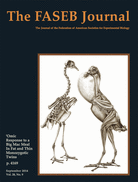 New research in The FASEB Journal suggests that the postprandial levels of circulating metabolites in the blood of identical twins tends to be similar after a fast food meal, independent of weight difference.
New research in The FASEB Journal suggests that the postprandial levels of circulating metabolites in the blood of identical twins tends to be similar after a fast food meal, independent of weight difference.
If you think losing weight is enough to prevent Type 2 diabetes, don’t get your hopes up. A new research report in September 2014 issue of The FASEB Journal, suggests that you don’t have to be overweight to develop Type 2 diabetes. [1] This study compared genetically identical twins-one heavier and one leaner-and found that after eating a fast-food meal, the circulating metabolites, including those related to Type 2 diabetes, were found in both individuals at the same levels. These findings suggest that the onset of this type of diabetes is largely influenced by genetic factors and/or the composition of gut microbiota.
“Our study contributes to better understanding of the genetic and environmental factors influencing several risk factors which are associated with obesity and metabolic disease (e.g., Type 2 diabetes),”
said Matej Oresic, Ph.D., study author from the Steno Diabetes Center in Gentofte, Denmark. “As such, our study may contribute to the efforts aimed at prevention and treatment of metabolic complications associated with obesity.”
To make this discovery, scientists studied identical twin pairs, where the twins differed in weight. They were healthy young adults from a national (Finnish) study of twins. The twins ate a fast food meal, and then gave many blood samples over several hours. A broad panel of small molecules (i.e., metabolites) was measured in blood, including amino acids, fatty acids and bile acids. The diversity of faecal microbiota also was assessed at the baseline. Results showed that twin-pair similarity is a dominant factor in the metabolic postprandial response, independent of obesity. Branched chain amino acids, known risk factors of diabetes, were increased in heavier as compared to leaner co-twins in the fasting state, but their levels converged postprandially. This study also demonstrated that specific bacterial groups were associated with postprandial changes of specific metabolites. This is the first comprehensive study examining metabolic postprandial responses in twins discordant for weight.
“When someone is overweight and at risk for diabetes, the conventional wisdom is to say ‘lose weight,’”
said Gerald Weissmann, M.D., Editor-in-Chief of The FASEB Journal, “and to a degree that recommendation holds true.
This report, however, shows that a calorie is not just a calorie as some would contend. Exactly what we eat and drink, and not just the number of calories, may be the most important factor in our health.
Reference
